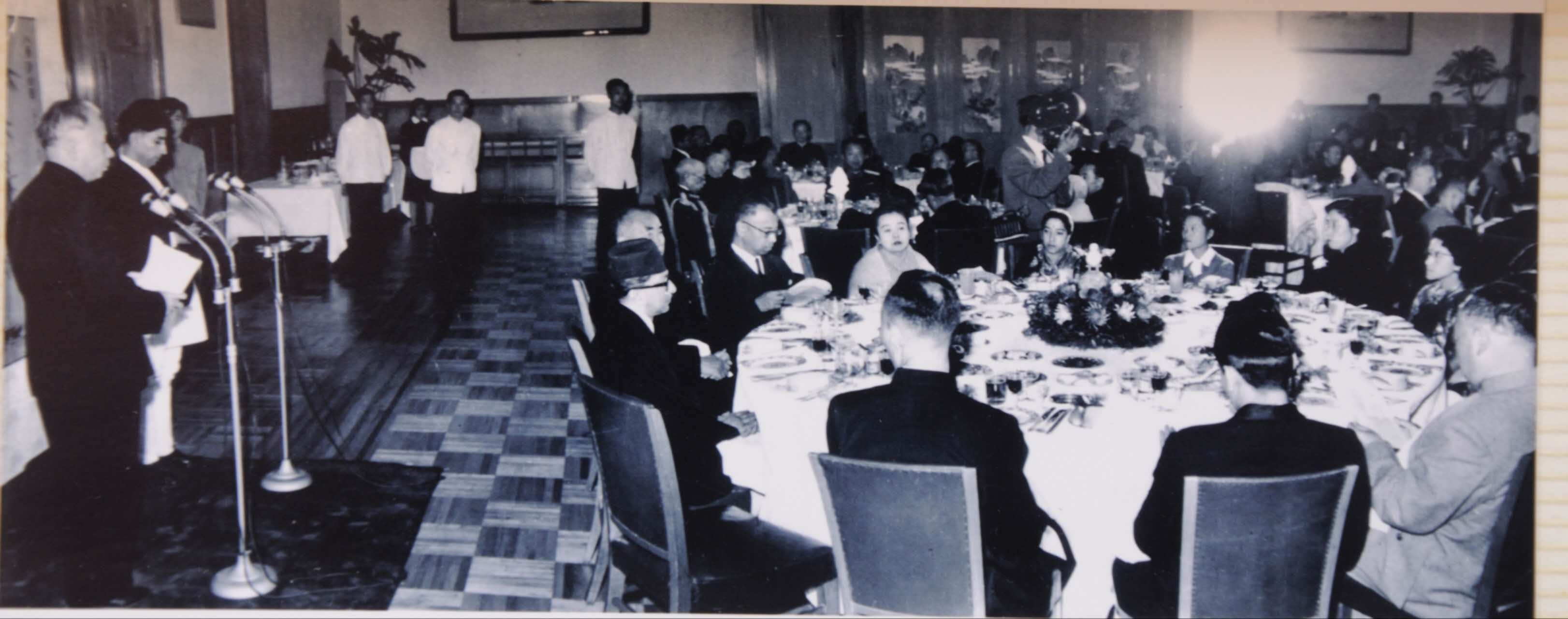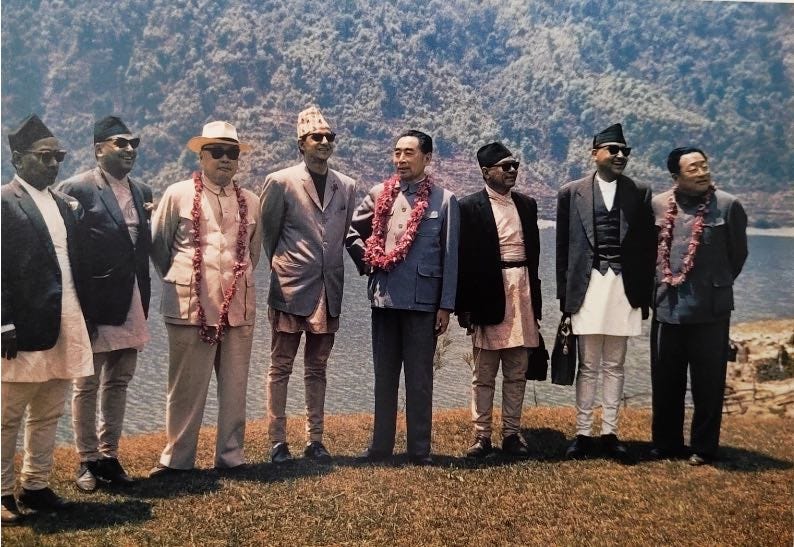Today (August 1, 2023) marks the 68th anniversary of the diplomatic relations between Nepal and China. In this special issue, we highlight the importance of language and translation when ensuring a friendly exchange of communication between two countries. In our blog’s previous articles, you will also find numerous pieces describing the early days of diplomatic relations.
Enjoy reading and Happy 68th anniversary of the Nepal - China diplomatic relations.

Sixty-eight years ago today, Nepal and China established diplomatic relations. Back then, China was still a young country building itself from the scratches of the civil war and was simultaneously building an effective foreign affairs department with the first batch of diplomats. Chinese Premier Zhou Enlai was in charge of training the newbies in diplomacy and foreign affairs. Zhou didn’t only mentor the new diplomats into their positions but also carefully supervised their performances. Still date, he is well remembered by his diplomats as mindful, considerate, and brilliant. As a newly built country with a young foreign affairs department, Zhou was early enough to stress the significance of learning foreign languages to improve diplomacy. Learning a foreign language not only adds to the advantage of the country’s diplomacy but also serves as an act of respect and adds convenience to the foreign country.
A well-known Chinese saying, “Nothing is trivial in diplomacy,” reminds every diplomat to be careful with their actions as a mistake will speak louder enough to impact their image. Nurturing China's new foreign affairs department, Zhou knew he also had to be an excellent supervisor to the first batch of diplomats.
Zhou Enlai’s official translator, Ji Chaozhu, recalls a state banquet for the visiting Nepali Prime Minister Tanka Prasad Acharya in September 1956. As Zhou Enlai delivered his toast, Ji quickly read out of a pre-translated speech script. Whether to test Ji or to improvise for himself, Zhou added a few words of praise for the guests at the end of the speech, which Ji overlooked until the end. Drowned in shame, Ji was disappointed.
Unexpectedly, the next day, Ji was again assigned to be the interpreter for another reception where the Mayor of Beijing, Peng Zhen, announced to present a flag and gift to the foreign guests. Ji made yet, another absentminded mistake of missing to translate the detail, but it wasn’t noticed until Zhou Enlai caught him by asking, “Why didn’t you complete your translation?” Ji hurriedly solved and informed about the gift and missed out on the flag, which Zhou supplemented. Out of embarrassment, Ji noted that he had translated it completely, to which Zhou urged Ji to be honest and “especially when dealing with work, you must never cheat. If you cheat, it will harm yourself if it is small. However, it will endanger the country if it is big”.
When the Chinese Premier visited Nepal with Foreign Minister Chen Yi in 1960, a reception was hosted to welcome him, and a wooden statue of Buddha was presented as a token of respect for the guests. The Chinese Premier delivered a heartfelt speech of gratitude on behalf of the guests. The Chinese-English translator, Pei Monong, first-generation diplomat and later Second Secretary of the Chinese Embassy in India, followed. Pei used the relative pronoun “which” to refer to the Buddha statue for which Zhou, without wasting a second, jumped in to correct him using a personal pronoun “whom”. Afterwards, Pei recalls Zhou teaching his comrades about Nepal’s Buddhist background and using different pronouns to avoid disrespect, especially religion, reminding them to pay attention to such aspects.
Understanding the country is crucial to better-implementing diplomacy with a foreign country. The first step to understanding any country is learning its language, which paves the path to comprehending its culture and society. Simultaneously, language can also be used as a courtesy tool for the other party during a meeting to make them feel at ease and respected for their nationality. In May of 1968, Deputy Prime Minister Kirti Nidhi Bista visited China for the second time and was welcomed with a banquet by the Chinese government, where an English interpreter was prepared. However, Bista started delivering his speech in the Nepali language and to Chinese Premier Zhou Enlai’s surprise, the English interpreter, who didn’t comprehend Nepali, translated the speech into Chinese. Zhou later learned that the interpreter was translating from a script he had obtained beforehand. Shaking his head, Zhou strictly protested, saying, “The guest didn’t speak in English; they spoke the Nepali language; why wasn’t a Nepali translator arranged? As a concierge, you must know how to respect the guests! It would be best if you respected the national sentiments of the guests!”.
Zhou firmly believed in using the respective country's national language during translation at the conversation table. “As long as there was a translator of that particular language, he would never use English or another common language, and this was also the case for Nepali,” said Zhang Zheng Gang, one of Zhou’s translators. In 1965, Zhou stressed that China needed translators who could speak different languages, “if we translate in the other party's language, the guests will feel comfortable and will take it as a gesture of respect. The respect of their country and individuals makes the relationship between the two sides easy to get close to."
By 1960, Chinese Premier Zhou had already dispatched a group of recent high school graduates to study Nepali in Tibet through the Ministry of Foreign Affairs. Among them was Zeng Xuyong, who became the only, if not the first, Nepali-speaking Chinese Ambassador to China and served from 1998 to 2001. Ambassador Zeng’s language skills would later come in handy when he had to navigate through the chaos of the aftermath of the Royal Massacre by being the only one who could understand the Nepali language television channel and radio broadcast.
The Chinese also made an effort to learn about Nepal during state receptions. 1963 Zhou Enlai hosted a welcome banquet for the first Nepali parliament delegation from Bishwa Bandhu Thapa to China. Zeng Xuyong, who was three years into learning Nepali in Tibet, was exclusively summoned for this visit to translate for the parliamentarians who needed Nepali translation. During the conversation, Zhou Enlai learned about the language diversity of Nepal and that English was not commonly spoken.
At this time, Vice Premier Li Xianian interrupted and said: "It is not enough for comrades engaged in diplomatic work to only know one or two foreign languages." Then turning to Han Nianlong, former Chinese ambassador to Pakistan and Sweden, Zhou said: "You are the deputy foreign minister; you should know a few more languages”. Premier Zhou agreed and noted that leading cadres in foreign affairs should also take the lead in learning foreign languages.
Furthermore, the translator at the banquet had been an occasional interpreter for not longer than two years but recalled Zhou knowing his name and background and immediately asked about the foreign language learning situation at the Jiangxi cadre school. When he learned about the lack of designated time and attention to foreign languages in the cadre school, Zhou immediately ordered Vice Minister Han to pay attention to this issue and assigned translation work to the school. Soon enough, a time slot of eight to nine o’clock in the evening was fixed for cadres to learn foreign languages. This was during the limiting times of the Cultural Revolution when many everyday practices were deemed away as “four olds[1]”; learning foreign languages was no exception. Because of Zhou’s concern, many foreign affairs cadres did not abandon learning foreign languages in cadre school.
While communicating in the native language adds comfort to the atmosphere for the foreign guests, it is also tiny gestures of concern and thoughtfulness from the hosts that become the cherry on top.
In 1956, Zhou hosted a luncheon for visiting Kirti Nidhi Bista and his delegation. Zhang recalls the lively and relaxed atmosphere where the guests were language while Zhou cracked jokes while making the guests comfortable. As the guests started helping themselves with the dishes on the table, Zhou noticed a delegation member silently sitting without a single spoon of food. Learning that the member was vegetarian and the menu had nothing suitable, Zhou apologised immediately, ordered vegetarian food and later learned about the miscommunication. Soon a plate of fried rice and vegetables was served, and to Zhou’s dissatisfaction, he remarked it to be " too simple. The head of the delegation is an honoured guest from our friendly neighbour. He has come from afar, and vegetarian food should be cooked decently! If I go to arrange, I can make a variety of delicious vegetarian dishes for the delegation.". Zhang recalls Bista and the other Nepali delegate visibly touched by this gestured and ushered Zhou not to be concerned, saying that “we are close neighbours and good friends so; it doesn’t matter”.
Zhou personally picked and served the dishes to the guests occasionally and even personally made a Peking Duck wrap for Bista.
Zhou knew how to make guests feel comfortable. During a reception hosted at the Nepali Embassy in Beijing, Niranjan Bhattarai, who was the Charge of affairs fluent in Mandarin and founder-principal of Biswo Bhasa Campus, Chinese Premier Zhou Enlai, made a note to inform Bhattarai about the Chinese interpreter he had brought proudly had been educated on the Nepali language from Biswo Bhasa Campus. Zhou even inquired about the progress of the Campus and offered support. It’s worth noting that it is hard to expect a similar level of intimacy during meetings in the present day. With strict and binding formalities and protocols, diplomacy has become more formal than formality today.

While China has since institutionalised and encouraged high school students to learn foreign languages recruiting them to the party and state foreign affairs department, Nepal’s Ministry of Foreign Affairs is yet to see its first and official Chinese language interpreter. Judging from our history of diplomacy with China, apart from the late 1950s when a Nepali student was sent to study at China’s elite Peking University, no significant contribution has been made in Sinology since then. Translations and language is the source of making such contribution. In today’s Nepal-China discourse, we have doubled down on having translators and interpreters and rely on the Chinese to translate into Nepali for our political elites to understand. As Premier Zhou once said: "Foreign languages are bridges, and all countries must have talents who understand foreign languages to conduct international exchanges and mutual exchanges and to establish friendship among peoples of all countries. Without bridges, rivers cannot be crossed."1
[1] Four olds as: old ideas, old customs, old culture, and old habits.
The following references were used when writing this article:
https://mp.weixin.qq.com/s/z8Ua7uqmR18ZJ3PnjktgZg
https://mp.weixin.qq.com/s/a_PxGwk1U7LbrTmxV8hAaQ
https://mp.weixin.qq.com/s/f2BxVwjaN-3MKm0U_drM_Q
https://mp.weixin.qq.com/s/0PecbUgWzZG0HRhS23vvOw
https://mp.weixin.qq.com/s/ZHOfQR10IbNtRCeTV8lAxQ






Impressive piece. Great contribution.